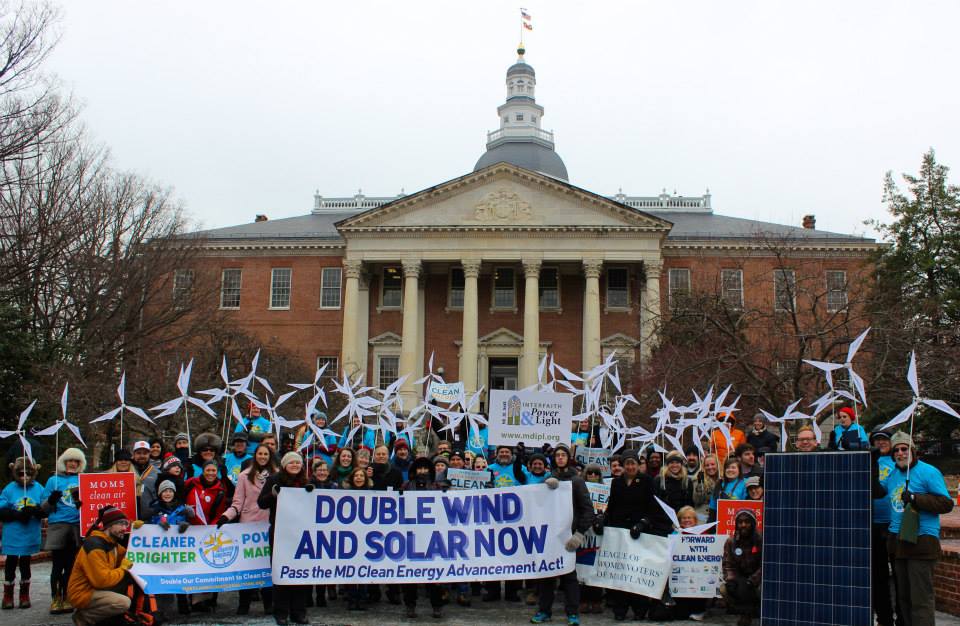Yesterday, the Maryland General Assembly’s 2015 legislative session came to a close. As legislators pack up their offices and return back to their districts, we know that they will carry a message back with them: Marylanders from Cove Point to the mountains of Western Maryland want our state to be a leader in climate change.
This year, we reintroduced the Clean Energy Advancement Act – landmark legislation that would have mandated that 40% of the electricity that we use to power our homes and communities comes from renewable sources such as wind and solar. The legislation was later amended to require that 25% of the energy we consume comes from renewable sources by 2020. This was a top priority of Maryland’s climate action plan and would’ve also placed Maryland on the trajectory to double wind and solar by 2025.
From the very first day up until the final vote was cast we kept our voices raised for clean energy.

We were there on the first day of session. As legislators entered their offices, activists packed Lawyers’ Mall to say that they want wind turbines and solar panels to dot Maryland’s landscape, not fracking wells and coal-fired powered plants. Activists knew that in order to transition Maryland to a clean energy future where public health is protected and our landscape is not marred by fossil fuel spewing energy sources that we needed to pass strong legislation. We needed to challenge Maryland’s utility companies to clean up their act and provide Maryland residents with electricity sourced from renewable sources such as wind and solar.
This year – more than ever, it was evident that the climate movement in Maryland is not comprised only of environmental activists. Our movement is comprised of people from all walks of life who want healthier families, new economic opportunities and cleaner air. We were joined on the first day of session by faith leaders, labor leaders, health advocates, and civil rights organizations. Each raised their voices to show Maryland’s leadership that the issue of climate change impacts the future of all Marylanders.

The faith community raised their voices: Over 250 faith leaders signed onto a letter calling upon our elected leaders to care for God’s creation. This was prompted by the efforts of the Ecumenical Leaders Group – a committee of seven leaders of Christian denominations. This marks the first time that this group of senior religious leaders has spoken out together on a matter of environmental concern.
The business community raised their voices: Over 150 businesses, from solar companies such as BithEnergy to a local 7-11 store, called on their elected leaders to pass the Clean Energy Advancement Act. Business owners such as Roger Blunt, a retired US Army General and founder of Essex construction, stated, “For the good of our economy, and for the good of our veterans, we need to pass the Maryland Clean Energy Advancement Act. By raising our renewable energy standard, we’ll send a strong market signal that Maryland is the place for solar and wind manufacturers to set up shop. We’ll also expand a growing clean energy workforce that employs a high percentage of veterans like me.”
Labor leaders raised their voices: This year we were joined by Maryland Working Families, SEIU Local 500 and SEIU 32 BJ. They know that a clean energy future would provide jobs that not only protect our environment but that support Maryland’s working families. Maryland’s manufacturing sector has been in decline over the last decade. Representatives of Maryland’s labor movement know that investing in the clean energy sector is a win-win for working families and economic development. “The Maryland Clean Energy Advancement Act means more jobs for Maryland, including more public sector jobs, more manufacturing and constructions jobs,” stated Charly Carter, Executive Director of Maryland Working Families. “That is a big win for all of Maryland’s workers and for our communities.”
Our legislators raised their voices: Sixty-two legislators cosponsored the Clean Energy Advancement Act. When the legislation came to a vote in the Senate Finance Committee, the chair Senator Mac Middleton and vice-chair Senator John Astle sent a strong message that they wanted to advance this bill out of the committee and onto the floor for a vote. Unfortunately, the bill stalled in the Senate Finance Committee. But thanks to everyone who took action, we have garnered the support of these key leaders in the General Assembly and will continue to garner the support of committee members next year.
And we raised our voices.

In my few short months organizing for the Chesapeake Climate Action Network, I have been amazed at the dedication and determination of our activists. Hundreds of you braved frigid temperatures and icy roads to stand in Lawyers’ Mall and rally for clean energy. Many of you traveled from all corners of the state to speak to your legislators about the Clean Energy Advancement Act. Over 100 activists met with their legislators. You called your legislators at critical points in our campaign to lead Maryland into a future where children can breathe clean air and families can thrive and be supported by good, green jobs. Over the last few weeks you did not become discouraged. You kept marching on submitting letters to the editor, visiting legislators offices and raising your voices for Maryland’s future.
When I look back over the last few months and the time, energy, and effort that was put into this campaign, I am reminded of a quote: “There is hope if people will begin to awaken that spiritual part of them, that heartfelt knowledge that we are caretakers of this planet.” While the Clean Energy Advancement Act was not enacted into law in 2015, I am hopeful. Each one of you who raised your voice and took a stand to preserve the earth for future generations has that same hope and knowledge instilled in your spirits. And indeed, we will continue to raise our voices until this is done.





